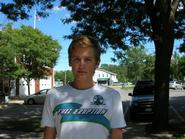
John Molfetas (Athens, Greece), a junior who spends his summers on the Greek island of Cephalonia, spent this summer on the island as usual, doing research into the electoral behavior of the islanders in the last 30 years. Molfetas had an Emerson grant to support his research and was advised by the Henry Platt Bristol Professor of International Affairs Alan Cafruny.
Molfetas analyzed the electoral results of national elections on Cephalonia from 1974 to 2000. By the end of his summer, he had created a political rendering of the island's recent history (which expanded to include both Cephalonia and nearby Ithaca, which is part of the same electoral district) and compiled short biographies of most of the candidates who participated.
Molfetas' research addressed the question of whether the islands had followed the general pattern of homogenization with the rest of Greece. He was able to confirm that the recent results conform closely to the general average, but the older results tend to be further from national trends. Molfetas put forth several explanations for this shift, one being television as a new method of information and motivation for debate, and the second being a relaxing in the political climate since the Cold War. "The stakes used to be higher," he summarized. The position of elected representatives has also changed in the last thirty years; previously candidates could enact a very strong personal influence on the electorate, but this influence has waned over the years.
Molfetas came to his first summer of research because the topic was so personal; "I'm election-mad," admitted Molfetas, who is passionate about political analysis. He was also inspired by family members; in his grant proposal, he shared memories of his grandfather, a politician and prominent lawyer on Cephalonia, and their political debates. "His love for history and local politics was passed on to me," Molfetas wrote, then added that there was also a practical motivation. "Given the lack of written material it is imperative that I research this topic soon so that I can interview people who have participated in the recent history before they die."
During the year, Molfetas is a member of the Student Assembly and the debate team. A government major considering a double major in history, Molfetas hopes to work in political analysis and prediction.
Molfetas' research this summer was funded by the Emerson Foundation Grant Program, which provides students with significant opportunities to work collaboratively with faculty mentors, researching an area of mutual interest. Recipients typically undertake some combination of fieldwork, laboratory investigation, library research and the development of teaching materials. A public presentation of their findings is required of all Emerson Scholars during the academic year.
-- by Lisbeth Redfield
Molfetas analyzed the electoral results of national elections on Cephalonia from 1974 to 2000. By the end of his summer, he had created a political rendering of the island's recent history (which expanded to include both Cephalonia and nearby Ithaca, which is part of the same electoral district) and compiled short biographies of most of the candidates who participated.
Molfetas' research addressed the question of whether the islands had followed the general pattern of homogenization with the rest of Greece. He was able to confirm that the recent results conform closely to the general average, but the older results tend to be further from national trends. Molfetas put forth several explanations for this shift, one being television as a new method of information and motivation for debate, and the second being a relaxing in the political climate since the Cold War. "The stakes used to be higher," he summarized. The position of elected representatives has also changed in the last thirty years; previously candidates could enact a very strong personal influence on the electorate, but this influence has waned over the years.
Molfetas came to his first summer of research because the topic was so personal; "I'm election-mad," admitted Molfetas, who is passionate about political analysis. He was also inspired by family members; in his grant proposal, he shared memories of his grandfather, a politician and prominent lawyer on Cephalonia, and their political debates. "His love for history and local politics was passed on to me," Molfetas wrote, then added that there was also a practical motivation. "Given the lack of written material it is imperative that I research this topic soon so that I can interview people who have participated in the recent history before they die."
During the year, Molfetas is a member of the Student Assembly and the debate team. A government major considering a double major in history, Molfetas hopes to work in political analysis and prediction.
Molfetas' research this summer was funded by the Emerson Foundation Grant Program, which provides students with significant opportunities to work collaboratively with faculty mentors, researching an area of mutual interest. Recipients typically undertake some combination of fieldwork, laboratory investigation, library research and the development of teaching materials. A public presentation of their findings is required of all Emerson Scholars during the academic year.
-- by Lisbeth Redfield
